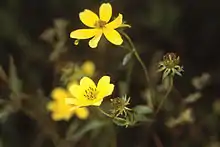Bidens aristosa
Bidens aristosa is a North American species of plants in the sunflower family. Common names include bearded beggarticks,[3] western tickseed,[4] long-bracted beggarticks, tickseed beggarticks, swamp marigold, and Yankee lice. It is native to eastern and central United States and south-central Canada, from Maine south to Florida and west as far as Ontario, Texas, and Nebraska.[5][6] It grows in wet meadows and abandoned fields.[7]
| Bidens aristosa | |
|---|---|
 | |
| Scientific classification | |
| Kingdom: | Plantae |
| Clade: | Tracheophytes |
| Clade: | Angiosperms |
| Clade: | Eudicots |
| Clade: | Asterids |
| Order: | Asterales |
| Family: | Asteraceae |
| Genus: | Bidens |
| Species: | B. aristosa |
| Binomial name | |
| Bidens aristosa | |
| Synonyms[2] | |
| |

Bidens aristosa seeds
Bidens aristosa is an annual herb occasionally reaching 150 cm (5 feet) in height. It has numerous yellow flower heads with both ray florets and disc florets. Fruits are dry achenes bearing barbs that get caught in fur or clothing, thus aiding in the plant's dispersal.[5] The plant attracts native bees.[7]
References
- "NatureServe Explorer 2.0". explorer.natureserve.org.
- "Bidens aristosa". The Global Compositae Checklist (GCC) – via The Plant List. Note that this website has been superseded by World Flora Online
- USDA, NRCS (n.d.). "Bidens aristosa". The PLANTS Database (plants.usda.gov). Greensboro, North Carolina: National Plant Data Team. Retrieved 9 January 2016.
- BSBI List 2007 (xls). Botanical Society of Britain and Ireland. Archived from the original (xls) on 2015-06-26. Retrieved 2014-10-17.
- Strother, John L.; Weedon, Ronald R. (2006). "Bidens aristosa". In Flora of North America Editorial Committee (ed.). Flora of North America North of Mexico (FNA). Vol. 21. New York and Oxford: Oxford University Press – via eFloras.org, Missouri Botanical Garden, St. Louis, MO & Harvard University Herbaria, Cambridge, MA.
- "Bidens aristosa". County-level distribution map from the North American Plant Atlas (NAPA). Biota of North America Program (BONAP). 2014.
- "Lady Bird Johnson Wildflower Center - The University of Texas at Austin". www.wildflower.org. Retrieved 2021-12-15.
This article is issued from Wikipedia. The text is licensed under Creative Commons - Attribution - Sharealike. Additional terms may apply for the media files.
